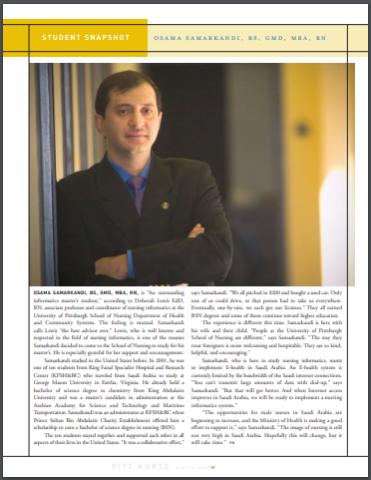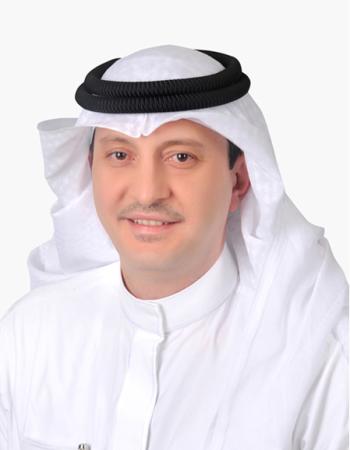STUDENT SNAPSHOT

OSAMA SAMARKANDI, BS, GMD, MBA, RN, is “An outstanding
informatics master’s student,” according to Deborah Lewis EdD, RN, associate professor and coordinator of nursing informatics at the University of Pittsburgh School of Nursing Department of Health
and Community Systems. The feeling is mutual. Samarkandi calls Lewis “the best advisor ever.” Lewis, who is well known and respected in the field of nursing informatics, is one of the reasons Samarkandi decided to come to the School of Nursing to study for his master’s. He is especially grateful for her support and encouragement.
Samarkandi studied in the United States before. In 2001, he was one of ten students from King Faisal Specialist Hospital and Research Center (KFSH&RC) who traveled from Saudi Arabia to study at George Mason University in Fairfax, Virginia. He already held a bachelor of science degree in chemistry from King Abdulaziz University and was a master’s candidate in administration at the Arabian Academy for Science and Technology and Maritime Transportation.
Samarkandi was an administrator at KFSH&RC when Prince Sultan Bin Abdulaziz Charity Establishment offered him a scholarship to earn a bachelor of science degree in nursing (BSN).
The ten students stayed together and supported each other in all aspects of their lives in the United States. “It was a collaborative effort, says Samarkandi. “We all pitched in $200 and bought a used car. Only one of us could drive, so that person had to take us everywhere. Eventually, one-by-one, we each got our licenses.” They all earned BSN degrees and some of them continue toward higher education.
The experience is different this time. Samarkandi is here with his wife and their child. “People at the University of Pittsburgh School of Nursing are different,” says Samarkandi. “The way they treat foreigners is more welcoming and hospitable. They are so kind, helpful, and encouraging.”
Samarkandi, who is here to study nursing informatics, wants to implement E-health in Saudi Arabia. An E-health system is currently limited by the bandwidth of the Saudi internet connections. “You can’t transmit large amounts of data with dial-up,” says Samarkandi. “But that will get better. And when Internet access improves in Saudi Arabia, we will be ready to implement a nursing informatics system.”
“The opportunities for male nurses in Saudi Arabia are beginning to increase, and the Ministry of Health is making a good effort to support it,” says Samarkandi. “The image of nursing is still not very high in Saudi Arabia. Hopefully this will change, but it will take time.”

